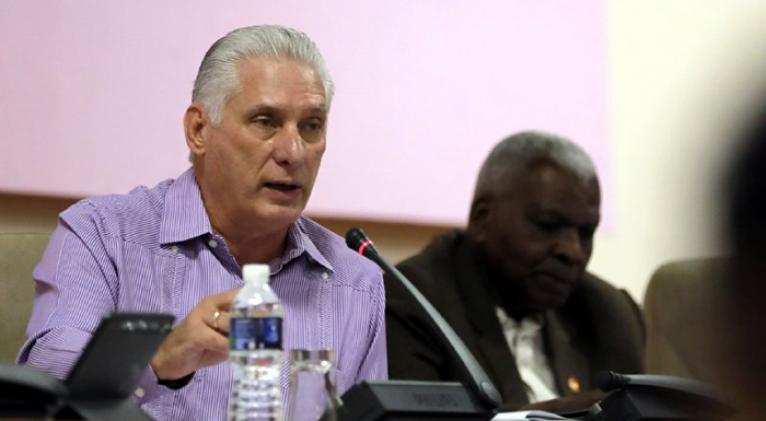 Guantánamo.- Miguel Díaz-Canel, First Secretary of the Communist Party of Cuba (PCC) and President of the Republic, stated today that without generating wealth amid current complex conditions, there is no way to stabilize the economy.
Guantánamo.- Miguel Díaz-Canel, First Secretary of the Communist Party of Cuba (PCC) and President of the Republic, stated today that without generating wealth amid current complex conditions, there is no way to stabilize the economy.
This principle lies at the core of the Government Program’s priorities to correct distortions and revitalize the economy, he emphasized during a meeting with the Economic Affairs Commission of Parliament. His remarks followed in-depth discussions among lawmakers regarding Cuba’s economic performance in the first half of the year, as presented by Joaquín Alonso Vázquez, Minister of Economy and Planning.
Díaz-Canel noted that the country’s current income is insufficient to purchase essential raw materials needed to boost domestic production, nor does it cover processed or semi-processed goods that could help establish a national currency market to absorb liquidity.
He stressed the urgent need for closed financing schemes to reactivate production, particularly exports, to increase revenue and ensure continued growth, thereby contributing funds to the central account.
The Cuban leader recalled that one of the agreements from the recent PCC
Central Committee plenum was to publicize the content of the Government Program, which, he asserted, provides solutions to the challenges being discussed.
“The ‘how’ is still being designed and promoted, but if everyone understands this program, feels more committed, and is given the opportunity to participate, new ideas and proposals will emerge to refine it, make necessary adjustments, and accelerate progress,” he said.
Díaz-Canel highlighted that his visits to local regions consistently reinforce his conviction that “we can move forward.” He pointed to the formation of collective workgroups with more participatory leadership, incorporating workers’ input in decision-making.
“How can we produce more, within our current means and scale?” he asked, underscoring the need to focus on exports, increasing foreign currency earnings, import substitution, overcoming an import-dependent mindset, and strengthening domestic production.
He noted that successful collectives not only increase revenue, profits, and wages but also improve workers’ well-being and stimulate local development.
The First Secretary cited the tobacco industry as an example of an export-
oriented sector that has consolidated results, benefiting everyone from producers to exporters. He praised their engagement with research centers and universities to explore innovations, calling them “inspiring examples that break through barriers.”
“Measures we approve should not solely focus on control but also on incentives, motivation, and fostering economic activity,” he said.
Díaz-Canel urged Cubans to embrace the conviction that “we will eat what we are capable of producing, rather than relying on imports.” While the country will continue subsidizing food for vulnerable groups, he warned against excessive dependence on rationed supplies, given the severe shortage of foreign currency for imports.